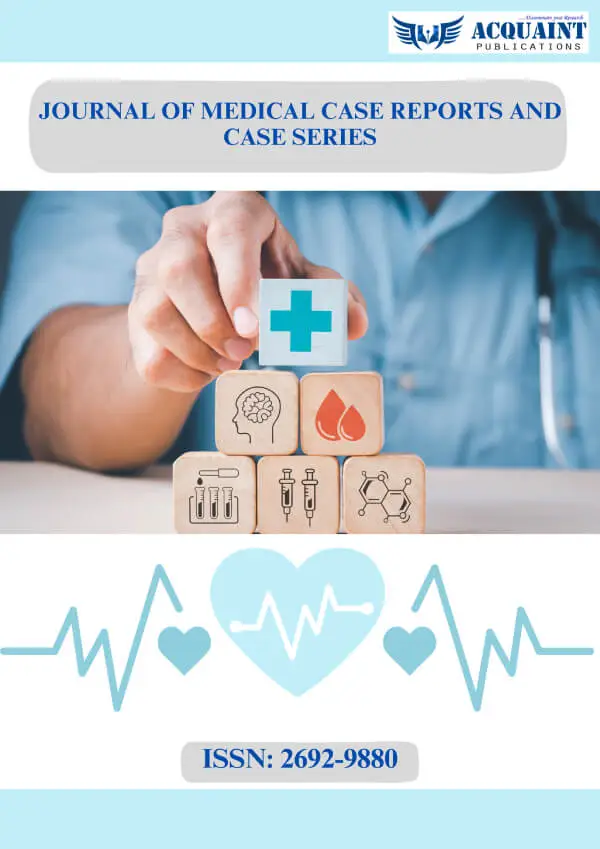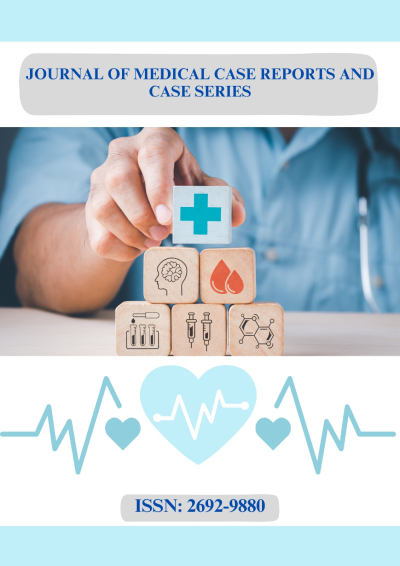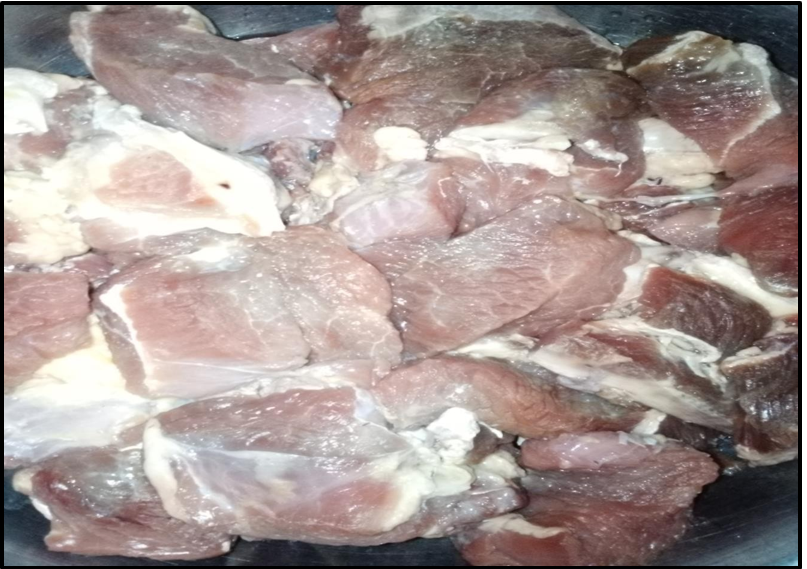Jimba Rai Amos1, J.C. Ogbu1*, O.O. Agarry1, Donas Nonso W1, O.O. Odunsanya2
1Department of Microbiology, University of Abuja.
2Biocrops Biotechnology Company Limited
*Corresponding Author: J.C. Ogbu, Department of Microbiology, University of Abuja.
Abstract
The study was carried out with the aim to isolate staphylococcus aureus from Cow meat and to determine the antibiogram pattern of Staphylococcus aureus. Three Samples of cow meat from three different locations in Gwagwalada were collected and isolation was carried out. The organisms Isolated were Salmonella spp, Escherichia coli, Staphylococcus aureus, Listeria monocytogenes. Several biochemical tests were carried out to identify isolates, antibiogram pattern was also carried out using commercially prepared discs. The pattern indicated that the overall Staphylococcus aureus was resistant to Pef, S, Cpx and less resistant to Am and APx. Results clearly suggested a possibility of potential public health threat of Staphylococcus aureus resulting from contamination of cow meat with pathogenic bacteria which is mainly due to unhygienic processing, handling and unhygienic environment.
Introduction
The right of a consumer is to have a product of good quality and not a product that will constitute any form of health hazards. Cow meat are highly desirable, palatable and highly nutritious. Cow meat consists of 20-40% Protein, others are water, fats, vitamins, phosphorus, iron and zinc (USAID, 2011). Quality products are those that meet some needs and expectations and are safe and wholesome as well. The microbiological safety and quality of cow meat are equally important to producers, retailers and consumers. Two quite different groups of microorganisms are relevant. One that are pathogenic and ones that are generally harmless to human health but being psychothrophic they are able to multiply on the product during chilling stage.
Materials and Methods
Study Area
The research was carried out in the microbiology laboratory of university of Abuja. It is situated within the savannah region with moderate climate conditions.
Sample Collection
Three Samples of cow meat were collected from three different areas namely: Gwagwalada market, Kasaun Dare, Abbatoir market all in Gwagwalada metropolis. The sample collected were wrapped aseptically in sterile polythene bags labelled appropriately. All the samples were transported immediately to the laboratory for analysis.
Homogenization of Cow meat Samples
20g of each of the cow meat Samples were ground in a sterile mechanical blender. 10mls of sterile water was added, the cow meat was blended in medium speed and slurry was obtained. Serial dilution of each slurry sample was carried out up to the 10th dilution. 0.1ml of liquid was obtained from each of the 10th dilution testube and cultured in two media, nutrient and MacConkey Agar.
Identification of isolates
The microorganisms obtained were subjected to morphological and biochemical tests according to the method described by (J.C. Ogbu et al., 2021).
Preparation of Pure culture of Isolates
22.2g of powdered Mannitol Salt Agar was weighed and dissolved in 200ml of distilled water and autoclaved at 121 degree Celsius for 15mins. Using a sterile wire loop, a strain of staphylococcus aureus was picked from each of the three petri dishes, serial dilution was performed and a loopful was picked from the 10^5 dilution and subcultured in a new media.
Results
Table 1: Antibiogram test for the Samples from each location
|
Antibiotics |
Gwagwalada market |
|
Kasaun Dare |
|
Abbatoir market |
|
|
|
Effectiveness |
Inhibition zone |
Effectiveness |
Inhibition zone |
Effectiveness |
Inhibition zone |
|
Pef- Pefloxacin |
Effective |
12.0 |
Effective |
12.0 |
Effective |
14.0 |
|
S- Streptomycin |
Effective |
8.0 |
Effective |
11.0 |
Effective |
10.0 |
|
Amx- Ampiclox |
Effective |
6.0 |
Effective |
8.0 |
Not effective |
Nil |
|
Am- Amoxicillin |
Not effective |
Nil |
Not effective |
Nil |
Effective |
7.0 |
|
Cpx- Ciprofloxacin |
Effective |
10.0 |
Effective |
10.0 |
Effective |
11.0 |
Table 2: Biochemical test results
|
Test |
Reaction |
|
Coagulase |
Positive |
|
Catalase |
Positive |
|
Oxidase |
Negative |
|
Mannitol |
Positive |
|
Gram reaction |
Positive |
Table 3: Physical examination of the colony
|
|
Nutrient Agar |
MacConkey Agar |
|
Colour |
Yellow |
Golden |
|
Shape |
Round |
Spherical |
Table 4: Average colony forming unit of Samples
|
|
Nutrient Agar |
|
|
MacConkey Agar |
|
|
|
Gwagwalada market |
0.8 |
0.7 |
0.8 |
0.2 |
0.1 |
0.5 |
|
Abbatoir market |
2.4 |
2.8 |
2.3 |
1.1 |
0.9 |
2.8 |
|
Kasaun Dare |
4.1 |
3.2 |
2.6 |
2.9 |
1.1 |
3.8 |
Table 5: Pure culture/Isolates for each sample per location
|
|
A |
B |
C |
Total |
|
Gwagwalada market |
01 |
03 |
01 |
05 |
|
Abbatoir market |
04 |
01 |
02 |
07 |
|
Kasaun Dare |
03 |
02 |
02 |
07 |
|
Total |
|
|
|
19 |
Discussion
Table 1 shows the antibiogram test results of the sample from the different locations. Pefloxacin, Ciprofloxacin and Streptomycin are effective against organisms from the three locations. Ampiclox was effective against organisms from Gwagwalada and Kasuan Dare, while Amoxicillin was effective against only organisms from the Abbatoir market. Table 2 shows the biochemical test results of the Moringa oleifera plant. Organisms were coagulase positive, Catalase positive, oxidase negative, Mannitol positive and Gram negative. Table 3 shows the physical examination of the isolates. In nutrient Agar, organisms were yellow and round. In MacConkey Agar, organisms were golden and spherical. Table 4 shows the average colony forming unit of the organisms. Table 5 shows the pure culture of Isolates in each location.
Conclusion
From the results of this study, it shows that meat that were sold in the market were already contaminated with microorganisms as a result of improper hygiene on the part of the workers, constant exposure to the open market, perching of flies, and other organisms from the cow.
References
- Ogbu JC, Akin-Osanaiye B.C, Okonkwo RE (2021) Bacteria Succession in Ten Diesel Polluted soil in Gwagwalada, Abuja. Nigeria. Global Scientific Journal. 9(9): 2320-9186
- Ogbu JC, Ugoh SC, Adetoun BE, Odusanya JT, Abubakar S (2024) Isolation, Identification and Antibiogram Activity of Bacteria from Urinary Tract Infected Women in Gwagwalada, Abuja – Nigeria. Journal of Sexual heal and Aids Res. 1(1): 01- 04.
- USAID, 2011. Agricultural Statistics 2011. US Government Printing office Washington 509pp Table 7.1.




